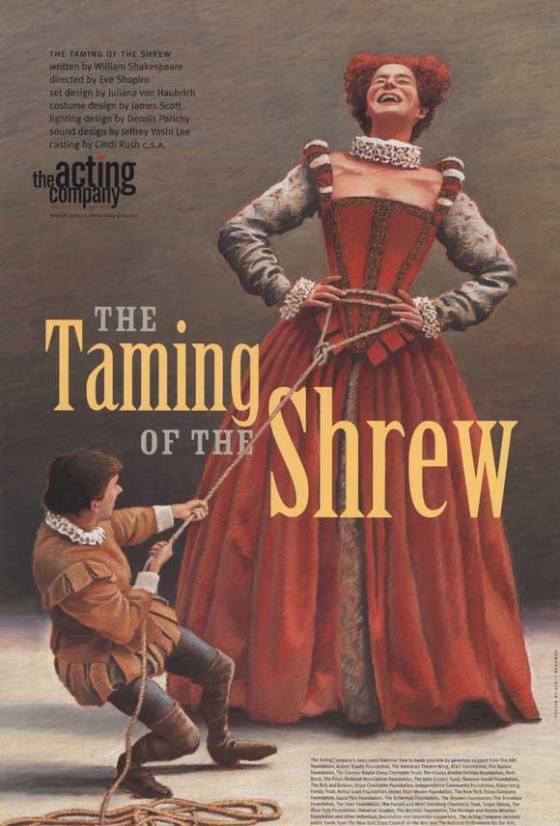Brianne Kane – Special to the Southern News
“Taming of the Shrew” is one of those plays most people don’t get to see acted out, but rather read in a literature class – Shakespeare would hate this (he might get over it considering how famous he is). “Taming of the Shrew,” however, is one play that really should be thought of as a moving picture, a play, or a movie, in your mind. The comical story of two sisters being courted in a twisted and tangled love story involving their father’s ridiculous rules, societal limitations, and serious questions about marital relations is a story that invents a movie in any readers head.
The plot of “Taming of the Shrew” follows the lives of two sisters, Bianca and Katherine; Bianca is the beautiful obedient one, while Katherine is the wild and sharp misbehaving sister. Their father has a rule however that Bianca may not marry until Katherine, the eldest sister, marries first. However, two men fall in love with Bianca and disguise themselves as tutors so they can get close to her, Lucentio and Hortensio. At the same time a third fellow, a friend of Lucentio, decides to marry Katherine as a favor to his friend. The story then circles the questions of gendered relations and what it means to be obedient, what it means to be a good woman/man, and what it means to be a good husband. Katherine and her new husband, Petruchio, argue and battle for power throughout the beginning of their relationship until the final scenes in which case it seems Katherine has finally succumbed to obedience.
This plot may sound familiar, as many movies have been based off this same story, such as “10 Things I hate About You,” “Deliver us From Eva,” “Kiss me Kate,” as well as four other film adaptations of the original story. In this reader’s opinion, this story is so famous for its universality and its attempt to discover new truths about gendered relations, compounded by societal and familial limitations and regulations. Lots of people can relate to Bianca, patiently waiting for her father to come to his senses and allow her to marry whomever she loves, or Katherine’s story hits home through the powerful experience of feeling like an outcast, or unloved.
One of the most important aspects to the play is the relationship between Petruchio and Katherine after they’ve been married. Petruchio begins “taming the shrew” Katherine (remember: “shrew” means “an unpleasant woman who is easily annoyed and who argues a lot,” as defined by the Cambridge Dictionaries into a wholesome happy wife, but his way of doing so is by starving her and not allowing her to sleep (torture techniques used in modern day war). Petruchio continues “taming” Katherine, by forcing her to agree with him when he spoke nonsense to an old man in the road while on their way back to Katherine’s home of Padua. Katherine and Petruchio return to Padua for the wedding of Lucentio and Bianca. During this ceremony however the obedience of three wives is tested: Bianca, newly married to Lucentio; Katherine, newly married to Petruchio; Hortensio and his new wife, a former widow. While the men are drinking and being merry, they send a note to their wife in the next room to come immediately to him – the test of obedience is who will come first, and most anxious to please. Bianca and “the widow” send back a note saying they are busy being merry, while Katherine comes rushing in. This is the moment where Katherine gives her most famous speech, reprimanding the other wives for not coming and declaring that her duty is happily to her husband for he suffers for her often, much like “the subject owes the prince.” This scene is understood in a plethora of ways, but in my opinion it is a lie. Katherine and Petruchio come to an understanding that his ridiculous requests to prove her obedience is a game, a power struggle, between two alpha-dogs stuck in the same cage. Katherine and Petruchio decide to prove everyone else wrong: all the people who were cruel to the loud mouthed Katherine as a child.
“Taming of the Shrew” is an old-sounding, weird name for a play by some dead guy – but it reads like a soap opera and is known for its funny quips in text. Reading Shakespeare is something you suffer through in high school, figure out how to do in college, and hopefully enjoy for the rest of your life. Because really, if you’re not reading hilarious, plot twisting, drama filled stories in your spare time – then why be able to read at all.




























































































